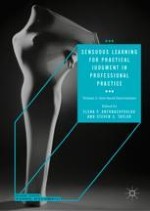The second volume of this ground-breaking book critically examines the effect of arts-based methods in combination as arts-based interventions in improving professional practice, from deinstitutionalization to the counteraction of destructive leadership. Taking a ‘human-centred’ approach, it delivers an insightful account of what these approaches do differently to achieve a new mode of learning – ‘sensuous learning’ – that cultivates professional judgment to serve the common good, simultaneously supporting personal and collective growth. The chapters present cutting edge examples of multiple ways arts-based interventions underpin learning arenas for expanding leadership and improving professional practice. The reflexivity cultivated through these learning arenas has the unique potential to improve professional practice, not merely by enhancing competence but also by cultivating character and conscience, which is central in making judgments that serve the common good. These benefits are relevant for professional practitioners sharpening the skills and behaviours needed in organisations, including creativity, diversity, imagination, and improvisation.
